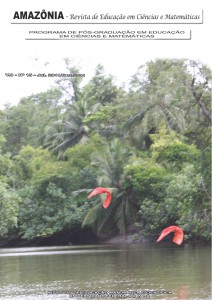Conceptions of health among biology teachers: an investigative tool
DOI:
https://doi.org/10.18542/amazrecm.v8i16.1662Keywords:
investigative tool, health conceptions, biology teachers, social causation, biologicismAbstract
It is presented here an investigative tool for use in research aimed at understanding the health concepts of biology teachers in basic education and/or higher education. Central element in the construction of the investigative tool is the understanding of the relevance of the socio-historical dimension in the genesis and in the transformation processes of knowledge, as indicated by the explanatory fleckian model of knowledge sociogenesis. Important contribution to the development of the questionnaire is offered by Barata (1985), which constructs a scheme that systematizes health concepts throughout human history. This tool was validated and then used to indicate the views of Parasitology and Microbiology university professors in a broader study, in which was investigated its academic genesis. The results of this first use in investigative processes of the questionnaire detected the presence of three distinct teachers’ profiles regarding the concepts of health: The undefined, those who reject the social causation and those who reject the simplistic conceptions of health, as hygienism and biologicism. Due to its quantitative character, the investigative tool is recommended for early stages of research, helping, for example, during the preliminary investigation, in the screening and selection of the sample for a more detailed research, of predominantly qualitative characterReferences
ALVES, A. J. O planejamento de pesquisas qualitativas em educação. Caderno de Pesquisas, São Paulo 77: 53-61. Maio 1991.
BARATA, R. B. A Historicidade do Conceito de Causa, in Textos de Apoio Epidemiologia 1. Rio de Janeiro. PEC/ENSP-ABRASCO, 1985.
BORGES, R. M. R. Em debate: Cientificidade e Educação em Ciências. Porto Alegre: Ed. CECIRS. 75p. 1996.
BRASIL. Ministério da Saúde. Doenças infecciosas e parasitárias: aspectos clínicos, de vigilância epidemiológica e de controle - guia de bolso / elaborado por Gerson Oliveira Pena [et al]. - Brasília : Ministério da Saúde : Fundação Nacional de Saúde, 2000.
BRASIL. (2007) Epidemiologia e Serviços de Saúde. Secretaria de Vigilância em Saúde. - Brasília 16(4). Ministério da Saúde. ISSN 1679-4974. 225 p.
CUTOLO, L. R. A.; DELIZOICOV D. Caracterizando a escola médica brasileira. Arquivos Catarinenses de Medicina Florianópolis 2003: 32 (4): 24-34.
DA ROS, M. A. Estilos de Pensamento em Saúde Pública: um estudo da produção da FSP-USP e ENSP-FIOCRUZ, entre 1948 e 1994, a partir da epistemologia de Ludwik Fleck. 2000. 207p. Tese (Doutorado em Ensino de Ciências). Universidade Federal de Santa Catarina. Florianópolis. 2000.
DELIZOICOV, N. C. O Professor de Ciências Naturais e o Livro Didático. 1995. 128p. Dissertação (Mestrado em Educação). Universidade Federal de Santa Catarina. Florianópolis, 1995.
FLECK, L. Gênese e Desenvolvimento de um Fato Científico. Belo Horizonte: Fabrefactum. 2010.
GATTI, B. A. (2004) Estudos quantitativos em educação. Educação e Pesquisa, 30(1): 11-30.
LIMA, P. G. Tendências paradigmáticas na pesquisa educacional. 2001. 317p. Dissertação (Mestrado em Educação). Universidade Estadual de Campinas. Campinas, 2001.
SERAPIONI, M. (2000). Métodos qualitativos e quantitativos: algumas estratégias para a integração”. Ciência & Saúde Coletiva 5(1): 187-192.
KUHN, T. S. A Estrutura das Revoluções Científicas. 9ª. Ed. Perspectiva. São Paulo. 2007. Pp. 9-17; 210-255.
ODA, W. Y. A docência universitária em biologia e suas relações com a realidade das metrópoles amazônicas. 2012. 358 p. Tese (Doutorado em Educação Científica e Tecnológica). Universidade Federal de Santa Catarina. Florianópolis, SC, 2012.



